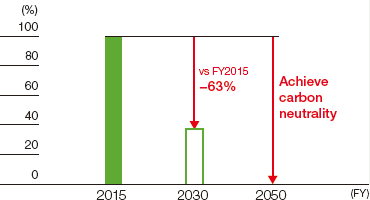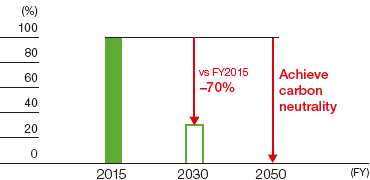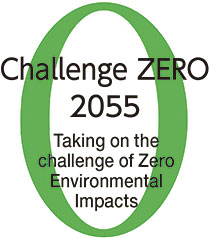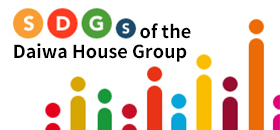The Daiwa House Group aims to realize a sustainable society as a Group that co-creates value for individuals, communities, and people’s lifestyles and tries to make “zero” environmental impacts within our Group, globally, and through supply chains.
Our Group formulated the long-term environmental vision “Challenge ZERO 2055” in fiscal 2016, focusing on 2055*, which marks the 100th anniversary of the foundation of Daiwa House Industry. We aim to realize a sustainable society and try to create “zero” environmental impacts through three stages (procurement, business activities, and products and services) with four environmental priority themes in mind (mitigating and adapting to climate change, harmony with the natural environment, closedloop resource sourcing and conservation of aquatic environments, and prevention of chemical pollution). Among these themes, seven targets of particular importance are defined as Challenge ZERO in order to accelerate our initiatives with specific milestones for 2030.
* With regard to climate change, we have set the year 2050 in light of social demands.
Four environmental priority themes
- Mitigating and adapting to climate change
- We aim for zero greenhouse gas emissions throughout the product life cycle through uncompromising pursuit of energy saving and utilization of renewable energy in order to achieve a decarbonized society.
In addition, we devise measures to avoid and minimize the negative impacts of climate change, and strive for the operation of businesses that are highly tolerant of climate change risk to realize a safe and secure society.
- Harmony with the natural environment
(Preservation of biodiversity) - In order to preserve and improve our natural capital, our Group shall prevent any net loss of biodiversity by ensuring zero deforestation through material procurement and by developing communities filled with greenery in harmony with the natural environment.
- Closed-loop resource sourcing and conservation of aquatic environments
(Greater durability and waste reduction) - With the aim of contributing to the emergence of a society committed to recycling, our Group is pursuing the sustainable use of resources by extending the service life of houses and buildings and working toward zero emissions of waste, as well as the use of recycled materials.
We also aim for sustainable utilization of water through reducing water consumption, total recycling of resources, and conservation of aquatic environments throughout our supply chain.
- Prevention of chemical pollution
- We shall institute appropriate management of chemical substances throughout the life cycle of houses and buildings to minimize the risk of adverse impacts on the health of people and ecosystems.

Phase
Procurement
- Resource extraction
- Transport of raw materials
- Material production
- Material transport
Business activities
- Office work / Vehicles
- Factories / Logistics
- Construction / Renovation
- Demolition
- Operation of office buildings
Products and services
- Single-family / Rental housing
- Condominiums
- Renovations
- Commercial facilities / Office buildings
- Environmental energy
Seven Challenge ZERO
* Prevention of chemical pollution is not defined as Challenge ZERO because it is already at the maintenance and management level.
The Group upholds Challenge ZERO initiatives with a specific year of 2055 in mind as an ultimate goal (the year 2050 for the item of mitigating and adapting to climate change). We also define the milestones for 2030 to increase effectiveness of the initiatives.
1 Challenge ZERO for CO2 in community development
Goal for 2050
Through turning newly constructed buildings into net zero energy buildings and by improving energy efficiency and energy-generation installation at existing buildings, as well as through supplying renewable energy, we aim to achieve carbon neutrality by 2050.

Reduction target for GHG emissions
from houses and buildings in use
Milestone for 2030
- By 2030, we aim to reduce greenhouse gas (GHG) emissions (total) from newly constructed buildings in the habitation and usage stage by 63% in comparison to FY2015.
- By 2030, we turn all newly constructed houses and buildings into ZEH/ZEB in principle, while also promoting the development of carbon neutral towns with 100% renewable energy by installing solar power generation systems in all buildings.
- We seek to complete renovation of existing buildings to turn them into ZEH/ZEB by application by 2030, while also promoting carbon neutrality through renovations to improve energy efficiency or install energy-generation facilities, as well as the supply of renewable energy.
2 Challenge ZERO for CO2 in business activities
Goal for 2050
We implement thorough energy-efficiency measures, turn newly built facilities into ZEBs, and utilize renewable energy to achieve carbon neutrality by 2050 in all facilities and all business processes.

GHG emission reduction targets in
business activities
Milestone for 2030
- By 2030, we aim to reduce GHG emissions (total) in all facilities and all business processes by 70% in comparison to FY2015.
- By further promoting energy saving for existing facilities and achieving ZEB for facilities to be newly constructed, we aim to double the Groupwide energy efficiency (sales unit per consumed energy) by 2030 from the fiscal 2015 levels.
- Working to expand renewable energy, we aim to attain 100% renewable energy for all the electricity used in our Group by 2025*.
* By fiscal 2023 for purchased electricity, excluding self-generated power
3 Challenge ZERO for CO2 in the supply chain
Goal for 2050
Through collaboration with suppliers, we aim to achieve carbon neutrality in the supply chain by 2050.
Milestone for 2030
- By 2025, we share with 90% of our principal suppliers the GHG reduction targets in line with the Paris Agreement and cooperate with them in the initiatives for energy efficiency and renewable energy in order for the principal suppliers to achieve the targets by 2030.
4 Challenge ZERO Deforestation
Goal for 2055
Through collaboration with suppliers, we aim to achieve zero deforestation arising from materials procurement at all segments by 2055.
Milestone for 2030
- By 2030, we work with suppliers to eliminate from procurement at our housing and construction businesses all timber that cannot be traced to legal harvest.
5 Challenge ZERO Harm to Biodiversity
Goal for 2055
We aim to prevent any net loss of biodiversity by 2055 through sustainable business operation that takes into consideration the protection of biodiversity, and enhancement of the amount and quality of green space in housing, construction, and community development.
Milestone for 2030
- By 2030, in all housing- and building-related businesses, we take steps to enhance the amount and quality of green space that take into consideration the protection of biodiversity, aiming to create in aggregate at least 2 million square meters of biodiversity-conducive green spaces.
- We will complete biodiversity assessments of all owned or managed sites and undertake ongoing conservation work at all ecologically significant ones* by 2030.
* Factories, company-owned forest sites, hotel vicinities, commercial facilities, city parks, etc. - Through reducing discarded plastics and other efforts, we aim to bring to zero the impact associated with marine plastic waste problems by 2030.
6 Challenge ZERO Waste and Reuse
Goal for 2055
We will use only recyclable or recycled materials at our housing and construction businesses by 2055. Through extending the durability of our buildings, we aim to minimize the volume of resources used and waste emissions.
We also aim to achieve zero waste emissions and total recycling of resources throughout supply chains across the Group.
Milestone for 2030
- By 2030, we seek to extend the durability and increase the variability of our new buildings. Also, by promoting renovation and remodeling of existing buildings, we help create a market for trading quality housing stock at fair valuations.
- We aim to achieve zero waste emissions and total recycling of resources throughout supply chains at in all housing- and building-related businesses by 2030. We also promote the use of recyclable or recycled materials.
7 Challenge ZERO Water-Associated Risks
Goal for 2055
We aim for sustainable utilization of water through reducing water consumption, total recycling of resources, and conservation of aquatic environments throughout supply chains across the Group by 2055.
Milestone for 2030
- By 2030, we aim to reduce water consumption (per unit of sales) by 45% vs fiscal 2012 at all sites and properties and in all processes.
- By 2030, we aim to complete water risk assessments in all housing-and building-related businesses in our supply chains, and complete water risk countermeasures at all owned locations and high-risk supplier locations.
- We aim to achieve a water-saving device adoption rate of 100% for new residential and hotel buildings by 2030.






